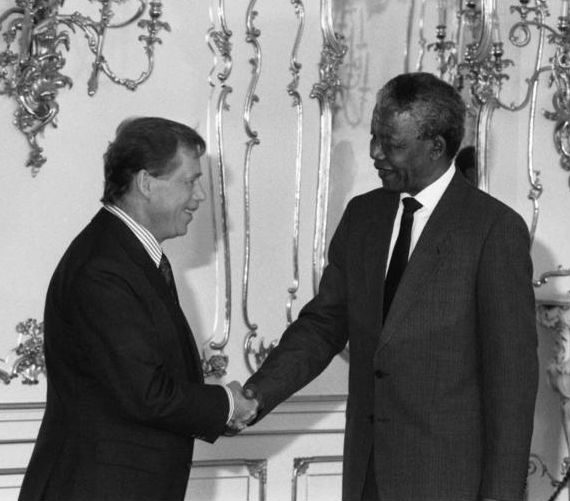The Berlin Wall references in the previous post remind me of one of my favorite examples of the indefensible foolishness that comes when conservative prudence calcifies into reflexive opposition to change. Here is Glenn Tinder standing athwart history yelling Stop! and arguing that defense of the prevailing culture is a moral obligation:
Still, a Christian in the United States, without being particularly discerning or morally sensitive, can see at least two things not so clearly visible to Third World Christian writers, particularly those liberation theologians who long for immediate social transformation. One of these is the universal disaster of revolution. There is perhaps not a single example in our time of a determined effort to produce swift and sweeping change which has not ended in tyranny; such efforts have often also ended in abominations, such as those witnessed in recent times in Cambodia, incalculably worse than those perpetrated by the old social order.
That’s from Tinder’s infamous Atlantic Monthly essay “Can We Be Good Without God?”
“The old social order,” may be unjust, Tinder paternalistically warns liberation theologians in their little countries, but any “determined effort to produce swift and sweeping change” will inevitably only produce something worse. This is, Tinder says, “universal.” He dares readers to come up with “a single example” that shows otherwise.

The essay is infamous because — in an epic example of historic bad timing — it was published in the December 1989 edition of the magazine.
Thus Tinder’s words above arrived in subscribers’ mailboxes and on newsstands alongside newspapers bearing pictures of joyful Germans tearing down the Berlin Wall, and pictures of flag-waving protesters and candlelit vigils filling the streets in Czechoslovakia, Hungary, Bulgaria and Romania. The mostly nonviolent people-power revolutions that began then — concurrent with the publication of Tinder’s essay — were followed by astonishingly peaceful revolutionary transformations in South Africa, the former Soviet Union, Chile and other countries.
December 1989 turned out to be probably the worst possible time ever to claim as a fact “the universal disaster of revolution.” The ink wasn’t even dry on poor Glenn Tinder’s assertion that “There is perhaps not a single example in our time of a determined effort to produce swift and sweeping change which has not ended in tyranny” before every other publication was dominated by news of example after example of that very thing.
I don’t think any other argument or essay has been so swiftly and so utterly proven wrong.
The revolutions of 1989 and the early 1990s weren’t all complete successes. Something like tyranny has been restored to some of the countries that attempted to overthrow former tyrannies during those years — a reassertion of the former status quo and a rebuilding of the fences and prevailing cultures that preserve the injustices favoring the privileged. In some places, in other words, “the old social order” was never swept away. And in the former Yugoslavia revolution led to a period of prolonged bloody chaos and dissolution, dampening the Jesus-Jones optimism of the initial revolutionary wave.
But 1989 happened. We saw it happen. We saw it demonstrate, undeniably, that this is a thing that can happen. The injustice of “the old social order” can be exchanged for something better, something more just, more free, more true.
The fences built to keep people out don’t have to stand forever.












